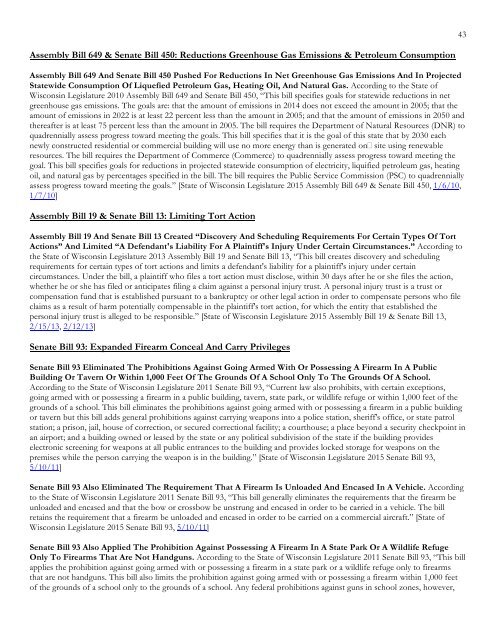Wisconsin-Report
Wisconsin-Report
Wisconsin-Report
Create successful ePaper yourself
Turn your PDF publications into a flip-book with our unique Google optimized e-Paper software.
43<br />
Assembly Bill 649 & Senate Bill 450: Reductions Greenhouse Gas Emissions & Petroleum Consumption<br />
Assembly Bill 649 And Senate Bill 450 Pushed For Reductions In Net Greenhouse Gas Emissions And In Projected<br />
Statewide Consumption Of Liquefied Petroleum Gas, Heating Oil, And Natural Gas. According to the State of<br />
<strong>Wisconsin</strong> Legislature 2010 Assembly Bill 649 and Senate Bill 450, “This bill specifies goals for statewide reductions in net<br />
greenhouse gas emissions. The goals are: that the amount of emissions in 2014 does not exceed the amount in 2005; that the<br />
amount of emissions in 2022 is at least 22 percent less than the amount in 2005; and that the amount of emissions in 2050 and<br />
thereafter is at least 75 percent less than the amount in 2005. The bill requires the Department of Natural Resources (DNR) to<br />
quadrennially assess progress toward meeting the goals. This bill specifies that it is the goal of this state that by 2030 each<br />
newly constructed residential or commercial building will use no more energy than is generated on site using renewable<br />
resources. The bill requires the Department of Commerce (Commerce) to quadrennially assess progress toward meeting the<br />
goal. This bill specifies goals for reductions in projected statewide consumption of electricity, liquified petroleum gas, heating<br />
oil, and natural gas by percentages specified in the bill. The bill requires the Public Service Commission (PSC) to quadrennially<br />
assess progress toward meeting the goals.” [State of <strong>Wisconsin</strong> Legislature 2015 Assembly Bill 649 & Senate Bill 450, 1/6/10,<br />
1/7/10]<br />
Assembly Bill 19 & Senate Bill 13: Limiting Tort Action<br />
Assembly Bill 19 And Senate Bill 13 Created “Discovery And Scheduling Requirements For Certain Types Of Tort<br />
Actions” And Limited “A Defendant's Liability For A Plaintiff's Injury Under Certain Circumstances.” According to<br />
the State of <strong>Wisconsin</strong> Legislature 2013 Assembly Bill 19 and Senate Bill 13, “This bill creates discovery and scheduling<br />
requirements for certain types of tort actions and limits a defendant's liability for a plaintiff's injury under certain<br />
circumstances. Under the bill, a plaintiff who files a tort action must disclose, within 30 days after he or she files the action,<br />
whether he or she has filed or anticipates filing a claim against a personal injury trust. A personal injury trust is a trust or<br />
compensation fund that is established pursuant to a bankruptcy or other legal action in order to compensate persons who file<br />
claims as a result of harm potentially compensable in the plaintiff's tort action, for which the entity that established the<br />
personal injury trust is alleged to be responsible.” [State of <strong>Wisconsin</strong> Legislature 2015 Assembly Bill 19 & Senate Bill 13,<br />
2/15/13, 2/12/13]<br />
Senate Bill 93: Expanded Firearm Conceal And Carry Privileges<br />
Senate Bill 93 Eliminated The Prohibitions Against Going Armed With Or Possessing A Firearm In A Public<br />
Building Or Tavern Or Within 1,000 Feet Of The Grounds Of A School Only To The Grounds Of A School.<br />
According to the State of <strong>Wisconsin</strong> Legislature 2011 Senate Bill 93, “Current law also prohibits, with certain exceptions,<br />
going armed with or possessing a firearm in a public building, tavern, state park, or wildlife refuge or within 1,000 feet of the<br />
grounds of a school. This bill eliminates the prohibitions against going armed with or possessing a firearm in a public building<br />
or tavern but this bill adds general prohibitions against carrying weapons into a police station, sheriff's office, or state patrol<br />
station; a prison, jail, house of correction, or secured correctional facility; a courthouse; a place beyond a security checkpoint in<br />
an airport; and a building owned or leased by the state or any political subdivision of the state if the building provides<br />
electronic screening for weapons at all public entrances to the building and provides locked storage for weapons on the<br />
premises while the person carrying the weapon is in the building.” [State of <strong>Wisconsin</strong> Legislature 2015 Senate Bill 93,<br />
5/10/11]<br />
Senate Bill 93 Also Eliminated The Requirement That A Firearm Is Unloaded And Encased In A Vehicle. According<br />
to the State of <strong>Wisconsin</strong> Legislature 2011 Senate Bill 93, “This bill generally eliminates the requirements that the firearm be<br />
unloaded and encased and that the bow or crossbow be unstrung and encased in order to be carried in a vehicle. The bill<br />
retains the requirement that a firearm be unloaded and encased in order to be carried on a commercial aircraft.” [State of<br />
<strong>Wisconsin</strong> Legislature 2015 Senate Bill 93, 5/10/11]<br />
Senate Bill 93 Also Applied The Prohibition Against Possessing A Firearm In A State Park Or A Wildlife Refuge<br />
Only To Firearms That Are Not Handguns. According to the State of <strong>Wisconsin</strong> Legislature 2011 Senate Bill 93, “This bill<br />
applies the prohibition against going armed with or possessing a firearm in a state park or a wildlife refuge only to firearms<br />
that are not handguns. This bill also limits the prohibition against going armed with or possessing a firearm within 1,000 feet<br />
of the grounds of a school only to the grounds of a school. Any federal prohibitions against guns in school zones, however,


